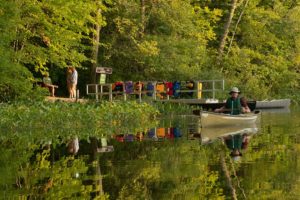
Proposal 1 on the Michigan ballot this November 3rd, proposes changes to how state park related funds are spent (full text of the proposal here). Over the past week, Proposal 1 has come under scrutiny by some members of the environmental community. We have been hearing from our constituents looking for clarity. I value immensely that our members and watershed residents engage deeply on environmental issues and do their own research to feel confident that their vote will help Michigan’s natural resources, not hurt. This is important.
In summary, HRWC continues to endorse Michigan Proposal 1, the Use of State and Local Park Funds Amendment. Proposal 1 makes key changes to the Michigan Natural Resources Trust Fund (MNRTF) and the State Parks Endowment Fund (SPEF). These funds come entirely from mineral, oil, and gas leases and royalties. Not tax dollars. If approved by voters, the proposal will amend the constitution to remove the cap currently in place on the MNRTF allowing the fund to increase over time bringing more dollars to acquiring and improving parks and public land. It also ensures a minimum allocation to park access, improvements and redevelopment. It does not reduce the amount of money available for land protection.
I’d like to address the most common concerns in a little more detail.
First, Proposal 1 will remove the cap on the size of the MNRTF. The MNRTF reached its cap in 2011 and has not been able to receive new royalties since then. The Constitution currently dictates that all new royalties must go to the SPEF until the SPEF reaches its $800 million cap. Currently, once that cap is reached, all new royalties would then go to the general fund and no longer to a Constitutionally protected fund for conservation and recreation. Removing the cap on the MNRTF maximizes the dollars going to public lands and parks and keeps them from being absorbed by the general fund.
Second, Proposal 1 will not reduce guaranteed funding for land acquisition. Currently, there is a 25% minimum spending requirement on land acquisition. Proposal 1 does not change this requirement. The current constitutional language leaves the remaining 75% of the fund to the discretion of the Trust Fund board, with park development (capped at 25%), payments in lieu of taxes on the lands acquired, administration and land acquisition as eligible uses. As the language stands now only 25% of the total fund is legally required to go to acquiring and improving parks and public lands. In both the current language and the proposed language, 75% of the fund could be spent on land acquisition in a given year.
Finally, Proposal 1 will increase funding for public access and recreation. Currently, spending on public recreation is capped at 25%. Proposal 1 changes the requirement to a minimum investment of 25%. This includes work like trails, parks, green space in our cities, redeveloping our urban riverfronts, and much more. And for the first time, funding can be allocated for redevelopment of existing infrastructure not just new development, often reducing the costs and environmental externalities like carbon emissions of these projects. I encourage you to read Dan Brown’s blog on how MNRTF investments have created the Huron River Water Trail you know and love.
These access and recreation dollars are critical for creating opportunities to enjoy our great outdoors around our population centers, so that every Michigander can benefit from our natural environment and develop their own commitment to protecting it.
Taken together, the amendments would guarantee at least 50% of the Michigan Natural Resources Trust Fund dollars go to parks and public lands (25 % minimum to acquisition, 25% minimum to recreation and access) and that the fund can grow without cap to increase total investments over time.
HRWC has joined more than 30 other environmental organizations throughout the state to endorse Proposal 1 because it is good for Michigan’s natural spaces and places.
For additional information visit https://ballotpedia.org/ and https://miwaterwildlifeparks.com/



